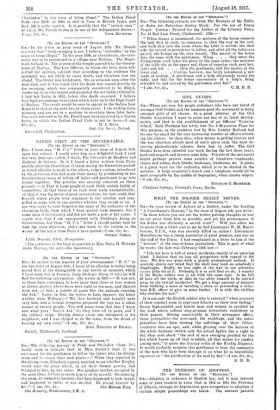LADIES FIRST AT THE DINNER-TABLE. ITo THE EDITOR or THE
"SPECTATOR."] 6111.—I hare seen " II. C.'s " letter in your issue of August 11th upon this subject. I would refer him to a delightful book I read not very long ago, called, I think, The Chevalier de Mounters and Madame de Sabran. In it I found a letter written from Paris shortly after the Revolution (I think during the Directoire period) in which allusion is made to the odious, vulgar custom, introduced by the parvenus, who had made their money by profiteering in the Revolutionary wars, of telling off ladies and gentlemen to go into dinner together. The practice was severely censured on three grounds :—(1) That it made people of rank think unduly highly of themselves; (2) that those of no rank were made uncomfortable; 131 that it was the death of good conversation; for bow could that flourish where people were strangers to one another and com- pelled to make talk to one another whether they would or no. I am very sorry to have forgotten the name of the authoress of the charming book, from -which I have quoted from memory, but I name upon it fortuitously and did not make a note of her name. I regret also that I am unacquainted with Fielding 's Essay on Conversation, but from "H. C.'s " letter I should gather that he took the same objection, under one head, to the custom as the writer of the letter from Paris I have quoted.—I am, Sir, de.,
Little Bounds, Fleet, Hampshire.
STEPHEN Sumac.
[The authoress of the book in question is Miss Nesta H. Webster (John Murray, 125. net).—Eo. Spectator.]


























 Previous page
Previous page